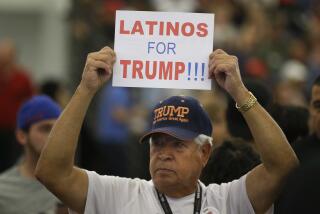Republican healthcare, purity stances complicate image makeover

Two unrelated occurrences — one in Washington, one in California — conspired this week to reinforce the Republican Party’s struggle to gain the up-and-coming voters it needs for long-term survival. And it also underscored the value Republicans place on purity, often to their electoral detriment.
In Washington, concern deepened about a threat by conservative Republicans in the House to shut down the government — in defiance even of their leaders’ desires — unless Congress explicitly cuts off funding for the nation’s new healthcare law. The insurance marketplaces established by the law, and championed by President Obama over GOP objections, are due to go into effect Oct. 1, the same day the new fiscal year begins.
In California, the team running the Republican gubernatorial effort of Abel Maldonado departed the campaign, leaving the candidate with almost no money, staff or establishment backing as he tries to take down a popular Democratic governor next year.
PHOTOS: 2013’s memorable political moments
The Washington developments certainly have a higher profile. Some party leaders have noted the clanging disconnect between the party’s stated desire to broaden beyond its base of mostly white voters, and its repeated attempts to kill the new healthcare plan. While it is being presented as principle — the need to halt a government overreach — the absence of any sort of proposed replacement lends a hostile cast. That could well be the take-away among black voters — Obama’s strongest supporters — and Democratic-leaning Latinos, the burgeoning voter bloc both parties desire.
An August poll by the Kaiser Family Foundation showed that views of the healthcare plan — derided as “Obamacare” by opponents — differed widely by ethnic group. Among whites, 52% opposed it and only 30% supported it. Views of Latinos were opposite, with 52% favoring it and 25% opposing it. Among blacks, 63% were in favor and 17% opposed.
Some of the appeal may be partisan — support for the plan may grow out of regard for the president. But it is also true that healthcare is a huge issue in many minority communities. An October 2012 survey by Pew Research Center’s Hispanic Trends Project showed that healthcare was listed as an “extremely important” issue by 50% of Latino voters, trailing only narrowly behind education and jobs.
“Healthcare has been a top three issue for Latinos for as long as we have been looking at the issues,” said Mark Hugo Lopez, Pew’s director of Hispanic Research, noting that immigrants particularly have difficulty obtaining insurance.
Separately, he said, surveys have shown that among Latino registered voters, more than half align themselves with the Democratic Party, five times the percentage that is attracted to the GOP.
PHOTOS: Team Obama, where are they now?
“For Latino registered voters, many see the Democratic Party as having more concern [for them] than the other parties,” he said.
While he did not draw a direct connection between the two findings — since the polls did not ask that specific question — many Republicans have acknowledged that their policies are blocking the party’s ability to entice new voter groups. The chief example is immigration reform — which, in another loud-and-clear message to Latino voters, has been stalled in the Republican House.
Issues are one component of the Republican Party’s difficulty in many parts of the country. Candidates are another, since they send a signal — or not — of affinity.
Maldonado, the son of a migrant farmworker who built a huge farming concern in Santa Maria, is hardly a perfect vessel; in his first spin on the national stage, he chewed gum throughout a Republican convention speech. His biggest splash this political season was his assertion that a criminal had been released from prison early under a program backed by Democratic Gov. Jerry Brown. As it turned out, the man cited had no connection to Brown’s program. Still, his presence suggests, at the very least, a different Republican Party.
Yet his campaign for governor, and unsuccessful bids for other offices, have been thwarted by fierce conservative objections to him, mostly the residue of a vote then-state Sen. Maldonado made years ago to raise taxes. His Republican opponents argue that his stance unacceptably violated a signature principle of the party.
But the opposition to him also demonstrates, in these hotly partisan times, that impurity will not be tolerated. And that lessens the odds that candidates like Maldonado — or some other moderate, say someone supporting immigration reform or healthcare reform — will surface among the Republican candidates to broaden the party’s appeal.
Twitter: @cathleendecker
More to Read
Start your day right
Sign up for Essential California for news, features and recommendations from the L.A. Times and beyond in your inbox six days a week.
You may occasionally receive promotional content from the Los Angeles Times.







